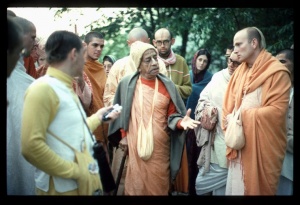CC Madhya 23.93 (1975): Difference between revisions
(Vanibot #0027: CCMirror - Mirror CC's 1996 edition to form a basis for 1975) |
(Vanibot #0020: VersionCompareLinker - added a link to the Version Compare feature) |
||
| Line 2: | Line 2: | ||
<div style="float:left">'''[[Sri Caitanya-caritamrta (1975)|Śrī Caitanya-caritāmṛta (1975)]] - [[CC Madhya (1975)|Madhya-līlā]] - [[CC Madhya 23 (1975)|Chapter 23: Life's Ultimate Goal — Love of Godhead]]'''</div> | <div style="float:left">'''[[Sri Caitanya-caritamrta (1975)|Śrī Caitanya-caritāmṛta (1975)]] - [[CC Madhya (1975)|Madhya-līlā]] - [[CC Madhya 23 (1975)|Chapter 23: Life's Ultimate Goal — Love of Godhead]]'''</div> | ||
<div style="float:right">[[File:Go-previous.png|link=CC Madhya 23.92 (1975)|Madhya-līlā 23.92]] '''[[CC Madhya 23.92 (1975)|Madhya-līlā 23.92]] - [[CC Madhya 23.94 (1975)|Madhya-līlā 23.94]]''' [[File:Go-next.png|link=CC Madhya 23.94 (1975)|Madhya-līlā 23.94]]</div> | <div style="float:right">[[File:Go-previous.png|link=CC Madhya 23.92 (1975)|Madhya-līlā 23.92]] '''[[CC Madhya 23.92 (1975)|Madhya-līlā 23.92]] - [[CC Madhya 23.94 (1975)|Madhya-līlā 23.94]]''' [[File:Go-next.png|link=CC Madhya 23.94 (1975)|Madhya-līlā 23.94]]</div> | ||
{{CompareVersions|CC|Madhya 23.93|CC 1975|CC 1996}} | |||
{{RandomImage}} | {{RandomImage}} | ||
==== TEXT 93 ==== | ==== TEXT 93 ==== | ||
| Line 18: | Line 17: | ||
<div class="synonyms"> | <div class="synonyms"> | ||
ei-mata—in this way; dāsye—in the transcendental mellow of servitude; dāsa—servants; sakhye—in the transcendental mellow of friendship; sakhā-gaṇa—the friends; vātsalye—in the transcendental mellow of | ei-mata—in this way; dāsye—in the transcendental mellow of servitude; dāsa—servants; sakhye—in the transcendental mellow of friendship; sakhā-gaṇa—the friends; vātsalye—in the transcendental mellow of paternal affection; mātā pitā—mother and father; āśraya-ālambana—the support or shelter of love as the abode or dwelling place of love. | ||
</div> | </div> | ||
| Line 25: | Line 24: | ||
<div class="translation"> | <div class="translation"> | ||
"Just as Lord Kṛṣṇa and Śrīmatī Rādhārāṇī are the object and shelter of the mellow of conjugal love, so, in the mellow of servitorship, Kṛṣṇa, the son of Mahārāja Nanda, is the object, and servants like Citraka, Raktaka and Patraka are the shelter. Similarly, in the transcendental mellow of friendship, Lord Kṛṣṇa is the object, and friends like Śrīdāmā, Sudāmā and Subala are the shelter. In the transcendental mellow of paternal affection, Kṛṣṇa is the object, and mother Yaśodā and Mahārāja Nanda are the shelter. | |||
</div> | </div> | ||
Latest revision as of 15:01, 27 January 2020

A.C. Bhaktivedanta Swami Prabhupada
TEXT 93
- ei-mata dāsye dāsa, sakhye sakhā-gaṇa
- vātsalye mātā pitā āśrayālambana
SYNONYMS
ei-mata—in this way; dāsye—in the transcendental mellow of servitude; dāsa—servants; sakhye—in the transcendental mellow of friendship; sakhā-gaṇa—the friends; vātsalye—in the transcendental mellow of paternal affection; mātā pitā—mother and father; āśraya-ālambana—the support or shelter of love as the abode or dwelling place of love.
TRANSLATION
"Just as Lord Kṛṣṇa and Śrīmatī Rādhārāṇī are the object and shelter of the mellow of conjugal love, so, in the mellow of servitorship, Kṛṣṇa, the son of Mahārāja Nanda, is the object, and servants like Citraka, Raktaka and Patraka are the shelter. Similarly, in the transcendental mellow of friendship, Lord Kṛṣṇa is the object, and friends like Śrīdāmā, Sudāmā and Subala are the shelter. In the transcendental mellow of paternal affection, Kṛṣṇa is the object, and mother Yaśodā and Mahārāja Nanda are the shelter.